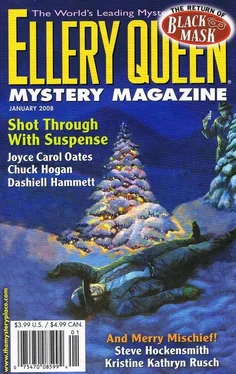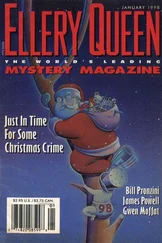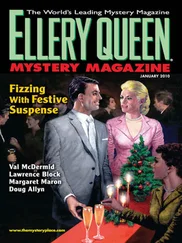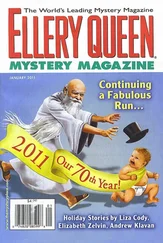Bill Crider - Ellery Queen's Mystery Magazine. Vol. 131, No. 1. Whole No. 797, January 2008
Здесь есть возможность читать онлайн «Bill Crider - Ellery Queen's Mystery Magazine. Vol. 131, No. 1. Whole No. 797, January 2008» весь текст электронной книги совершенно бесплатно (целиком полную версию без сокращений). В некоторых случаях можно слушать аудио, скачать через торрент в формате fb2 и присутствует краткое содержание. Город: New York, Год выпуска: 2008, ISBN: 2008, Издательство: Dell Magazines, Жанр: Детектив, на английском языке. Описание произведения, (предисловие) а так же отзывы посетителей доступны на портале библиотеки ЛибКат.
- Название:Ellery Queen's Mystery Magazine. Vol. 131, No. 1. Whole No. 797, January 2008
- Автор:
- Издательство:Dell Magazines
- Жанр:
- Год:2008
- Город:New York
- ISBN:ISSN 0013-6328
- Рейтинг книги:3 / 5. Голосов: 1
-
Избранное:Добавить в избранное
- Отзывы:
-
Ваша оценка:
- 60
- 1
- 2
- 3
- 4
- 5
Ellery Queen's Mystery Magazine. Vol. 131, No. 1. Whole No. 797, January 2008: краткое содержание, описание и аннотация
Предлагаем к чтению аннотацию, описание, краткое содержание или предисловие (зависит от того, что написал сам автор книги «Ellery Queen's Mystery Magazine. Vol. 131, No. 1. Whole No. 797, January 2008»). Если вы не нашли необходимую информацию о книге — напишите в комментариях, мы постараемся отыскать её.
Ellery Queen's Mystery Magazine. Vol. 131, No. 1. Whole No. 797, January 2008 — читать онлайн бесплатно полную книгу (весь текст) целиком
Ниже представлен текст книги, разбитый по страницам. Система сохранения места последней прочитанной страницы, позволяет с удобством читать онлайн бесплатно книгу «Ellery Queen's Mystery Magazine. Vol. 131, No. 1. Whole No. 797, January 2008», без необходимости каждый раз заново искать на чём Вы остановились. Поставьте закладку, и сможете в любой момент перейти на страницу, на которой закончили чтение.
Интервал:
Закладка:
Seeing them, you couldn’t doubt that they were really dead. Every detail of their falling, every detail of the heap in which they now lay, had a horrible certainty of lifelessness in it.
I turned to Stacey, who, deathly white himself, was keeping on his feet only by clinging to the foot of the brass bed.
“Get the woman out! Get doctors — police!”
I pulled the three dead bodies apart, laying them out in a grim row, faces up. Then I made a hasty examination of the room.
A soft hat, which fitted one of the dead men, lay in the center of the unruffled bed. The room key was in the door, on the inside. There was no blood in the room except what had leaked out of the clothespress, and the room showed no signs of having been the scene of a struggle.
The door to the bathroom was open. In the bottom of the bathtub was a shattered gin bottle, which, from the strength of the odor and the dampness of the tub, had been nearly full when broken. In one corner of the bathroom I found a small whiskey glass, and another under the tub. Both were dry, clean, and odorless.
The inside of the clothespress door was stained with blood from the height of my shoulder to the floor, and two hats lay in the puddle of blood on the closet floor. Each of the hats fitted one of the dead men.
That was all. Three dead men, a broken gin bottle, blood.
Stacey returned with a doctor, and while the doctor was examining the dead men, the police detectives arrived.
The doctor’s work was soon done.
“This man,” he said, pointing to one of them, “was struck on the back of the head with a small blunt instrument, and then strangled. This one” — pointing to another — “was simply strangled. And the third was stabbed in the back with a blade perhaps five inches long. They have been dead for about two hours — since noon or a little after.”
The assistant manager identified two of the bodies. The man who had been stabbed — the first to fall out of the clothespress — had arrived at the hotel three days before, registering as Tudor Ingraham of Washington, D.C., and had occupied room 915, three doors away.
The last man to fall out — the one who had been simply choked — was the occupant of the room. His name was Vincent Develyn. He was an insurance broker and had made the hotel his home since his wife’s death, some four years before.
The third man had been seen in Develyn’s company frequently, and one of the clerks remembered that they had come into the hotel together at about five minutes after twelve this day. Cards and letters in his pockets told us that he was Homer Ansley, a member of the law firm of Lankershim and Ansley, whose offices were in the Miles Building — next-door to Develyn’s office.
Develyn’s pockets held between $150 and $200; Ansley’s wallet contained more than $100; Ingraham’s pockets yielded nearly $300, and in a money-belt around his waist we found $2,200 and two medium-sized unset diamonds. All three had watches — Develyn’s was a valuable one — in their pockets, and Ingraham wore two rings, both of which were expensive ones. Ingraham’s room key was in his pocket.
Beyond this money — whose presence would seem to indicate that robbery hadn’t been the motive behind the three killings — we found nothing on any of the persons to throw the slightest light on the crime. Nor did the most thorough examination of both Ingraham’s and Develyn’s rooms teach us anything.
In Ingraham’s room we found a dozen or more packs of carefully marked cards, some crooked dice, and an immense amount of data on racehorses. Also we found that he had a wife who lived on East Delavan Avenue in Buffalo, and a brother on Crutcher Street in Dallas; as well as a list of names and addresses that we carried off to investigate later. But nothing in either room pointed, even indirectly, at murder.
Phels, the Police Department Bertillion man, found a number of fingerprints in Develyn’s room, but we couldn’t tell whether they would be of any value or not until he had worked them up. Though Develyn and Ansley had apparently been strangled by hands, Phels was unable to get prints from either their necks or their collars.
The maid who had discovered the blood said that she had straightened up Develyn’s room between ten and eleven that morning, but had not put fresh towels in the bathroom. It was for this purpose that she had gone to the room in the afternoon. She had gone there earlier — between 10:20 and 10:45 — for that purpose, but Ingraham had not then left.
The elevator man who had carried Ansley and Develyn up from the lobby at a few minutes after twelve remembered that they had been laughingly discussing their golf scores of the previous day during the ride. No one had seen anything suspicious in the hotel around the time at which the doctor had placed the murders. But that was to be expected.
The murderer could have left the room, closing the door behind him, and walked away secure in the knowledge that at noon a man in the corridors of the Montgomery would attract little attention. If he was staying at the hotel he would simply have gone to his room; if not, he would have either walked all the way down to the street, or down a floor or two and then caught an elevator.
None of the hotel employees had ever seen Ingraham and Develyn together. There was nothing to show that they had even the slightest acquaintance. Ingraham habitually stayed in his room until noon, and did not return to it until late at night. Nothing was known of his affairs.
At the Miles Building we — that is, Marty O’Hara and George Dean of the Police Department Homicide Detail, and I — questioned Ansley’s partner and Develyn’s employees. Both Develyn and Ansley, it seemed, were ordinary men who led ordinary lives: lives that held neither dark spots nor queer kinks. Ansley was married and had two children; he lived on Lake Street. Both men had a sprinkling of relatives and friends scattered here and there through the country; and, so far as we could learn, their affairs were in perfect order.
They had left their offices this day to go to luncheon together, intending to visit Develyn’s room first for a drink apiece from a bottle of gin someone coming from Australia had smuggled in to him.
“Well,” O’Hara said when we were on the street again, “this much is clear. If they went up to Develyn’s room for a drink, it’s a cinch that they were killed almost as soon as they got in the room. Those whiskey glasses you found were dry and clean. Whoever turned the trick must have been waiting for them. I wonder about this fellow Ingraham.”
“I’m wondering, too,” I said. “Figuring it out from the positions I found them in when I opened the closet door, Ingraham sizes up as the key to the whole thing. Develyn was back against the wall, with Ansley in front of him, both facing the door. Ingraham was facing them, with his back to the door. The clothespress was just large enough for them to be packed in it — too small for them to slip down while the door was closed.
“Then there was no blood in the room except what had come from the clothespress. Ingraham, with that gaping slit in his back, couldn’t have been stabbed until he was inside the closet, or he’d have bled elsewhere. He was standing close to the other men when he was knifed, and whoever knifed him closed the door quickly afterward.
“Now, why should he have been standing in such a position? Do you dope it out that he and another killed the two friends, and that while he was stowing their bodies in the closet his accomplice finished him off?”
“Maybe,” Dean said.
And that “maybe” was still as far as we had gone three days later.
We had sent and received bales of telegrams, having relatives and acquaintances of the dead men interviewed; and we had found nothing that seemed to have any bearing upon their deaths. Nor had we found the slightest connecting link between Ingraham and the other two. We had traced those other two back step by step almost to their cradles. We had accounted for every minute of their time since Ingraham had arrived in San Francisco — thoroughly enough to convince us that neither of them had met Ingraham.
Читать дальшеИнтервал:
Закладка:
Похожие книги на «Ellery Queen's Mystery Magazine. Vol. 131, No. 1. Whole No. 797, January 2008»
Представляем Вашему вниманию похожие книги на «Ellery Queen's Mystery Magazine. Vol. 131, No. 1. Whole No. 797, January 2008» списком для выбора. Мы отобрали схожую по названию и смыслу литературу в надежде предоставить читателям больше вариантов отыскать новые, интересные, ещё непрочитанные произведения.
Обсуждение, отзывы о книге «Ellery Queen's Mystery Magazine. Vol. 131, No. 1. Whole No. 797, January 2008» и просто собственные мнения читателей. Оставьте ваши комментарии, напишите, что Вы думаете о произведении, его смысле или главных героях. Укажите что конкретно понравилось, а что нет, и почему Вы так считаете.












